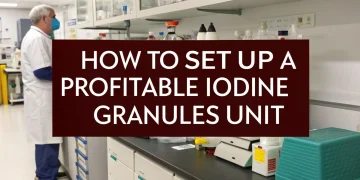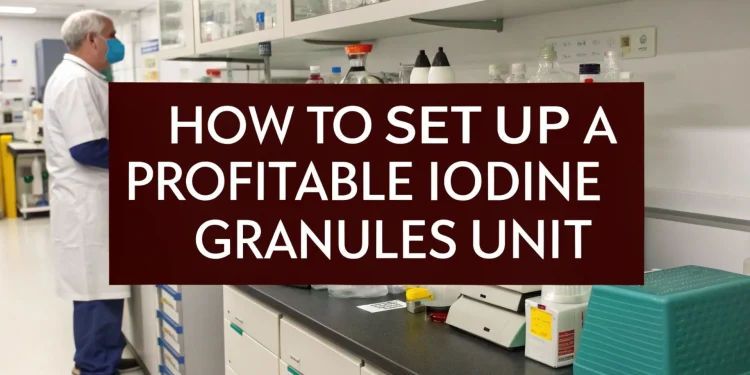More than ever, iodine is necessary for a wide variety of applications including pharmaceuticals, radiographic contrast agents, biocides, and even animal feed. In fact, the production of granulated iodine poses a highly profitable opportunity due to the growing demand for iodine derivatives across the healthcare, food processing, and chemical synthesis industries. Extracted from iodine crystals or iodine powder, granulated iodine has numerous advantages as compared to raw iodine such as easier handling, storage, dosing, and formulation.
Establishing a specialized unit for the production of granulated iodine presents a unique opportunity for chemical entrepreneurs seeking to operate within the specialty chemicals sector. This emerging segment features a compelling business proposition as it comes with a low-to-moderate investment, streamlined technology, and rising domestic and global demand. Furthermore, in countries like India, where the iodine processing industry is still developing and a significant portion of the supply chain relies on imported materials, the production of granulated iodine forms an opportunity for value addition that reduces dependence on imports while bolstering the domestic pharmaceutical and veterinary industries.
Setting up a granulated iodine manufacturing unit is a business venture that this article leads you through. We will discuss the production flow, required machines and infrastructure, legal frameworks, cost and profit margins, and the project role of institutes like NIIR Project Consultancy Services (NPCS) which offers to help businesses with comprehensive chemical manufacturing turnkey solutions.
Market Potential and Industry Scope
With key sectors fuelling the demand, the market potential for iodine granules is rapidly expanding. Pharmaceutical manufacturers utilize iodine granules for antiseptic production as well as povidone-iodine and other topical and oral dosage forms for pharmacologically active ingredients. In agriculture and veterinary science, it is used as a nutritional feed additive and disinfecting agent in milk operations. Even the food industry uses iodine, in the form of iodized salt, to eliminate deficiency disorders especially in developing countries.
Compared to iodine crystals or powders, iodine granules have superior stability and improved ease of use while handling bulk materials in large scale production settings. The reduction of dust generation, improved uniformity, and better controlled dissolution during measurement further sets granules apart.
Chile, Japan, and the USA are the three dominant producers of iodine in the world. On the other hand, India imports most of its iodine from Japan and Chile. Businesses can serve domestic bulk drug manufacturers, food processors, animal feed companies, and disinfectant manufacturers by filling the local business granule production gap using imported iodine crystals or powder and integrating into the iodine value chain.
NIIR Project Consultancy Services has developed multiple techno-commercial feasibility reports on specialty chemical projects including iodine granulation. New businesses poised to enter this niche, yet high-value space, can benefit from NIIR’s market forecasts, pricing models, and buyer identification services.
Related: Top 20 Chemical Export Business Ideas For Entrepreneurs
Understanding the Raw Material: Iodine Crystals and Powder
The primary raw material for granulated iodine production is iodine in crystal or powder form. Virtually all iodine crystals are acquired from caliche ore mining or brine extraction followed by sublimation refinement. The dark violet, volatile crystals are iodine crystals. Iodine powder refers to the less stable form of iodine used in small scale industrial formulations and is simply put, pulverized iodine crystals.
In India, iodine crystals or powder are mostly imported, but global distributors or chemical stockists can be accessed directly. The required purity levels for granule manufacturing are between 99.5% to 99.9% for different segments. For pharmacopeial iodine granules, USP, EP, or IP certified high purity iodine grade iodides are required.
As iodine is sensitive to light, moisture, and air, proper storage is very important. To avoid sublimation and degradation, the material must be stored in sealed, unbreakable polycarbonate (UV) shielded boxes kept in dry and cool places. To maintain the safety of the operators, processing requires respiratory gloves and masks exhaust systems.
For iodide powders and crystals, NIIR Project Consultancy Services has published technical documentation with precise descriptions and comprehensive quality criteria. Through vendor mapping, other domestic and foreign buyers can also be routed to trustworthy suppliers for their needs and stock volumes, preferred shipping region or entire country, and pricing thresholds.
Manufacturing Iodine Granules
The transformation undertaken processing granules of iodine into iodide crystals and powders is batch/single operations or semi-continuous and encompasses multiple process steps granular sieving alongside classification, drying, and packaging included. The type of granule being manufactured, pharmaceutic, feed grade, or industrial, is the only determining factor to these steps having slight variations.
Preparation of iodine as a feedstock requires breaking crystallized iodine into a powder form using either pulverizers or micronizers, where the crystallized iodine undergoes grinding. Once pulverized, polyvinylpyrrolidone (PVP), starch derivatives, or microcrystalline cellulose which act as binding agents are added to the powdered iodine mixture in accordance to a given formulation. Such mixtures are as well processed by mixers to ensure homogeneity.
Fluid bed granulators or high shear granulators are mostly preferred for the granulation processes. During this phase, the powdered iodine mixture has to undergo a certain level of moisture and stirring in order to promote the formation of free-flowing granules. To inhibit the loss of iodine through sublimation, temperature and moisture levels must be moderately tight.
Once the granules are formed, they undergo moderate heating within fluidized or tray dryers. This enhances the iodine content by tempering excess moisture within the granules. The temperate granules are then screened using rotary sifters or vibro sievers to sort out particles with a uniform size distribution.
During stocking and transport, about moisture preventing pouches and HDPE containers filled with desiccants, the granules are stored. In as much as frequent sealing or flushing uses breathe free environments, highly sensitive grades of pharmaceuticals tend to suffer from vacuum sealing or nitrogen flushing.
NIIR Project Consultancy Services includes the SOPs, process validation instructions, and custom flow diagrams in their technical feasibility documents to ensure adherence and achieve compliance for processes and product quality.
Machinery and Plant Setup
The setup of machinery for a granulated iodine manufacturing plant is directly linked to the operational scale and the degree of automation desired. An iodine pulverizer, binder solution mixer, granulator (rapid mixer or fluid bed), drying unit, sieving unit, and automated fill and seal machines comprise the equipment configuration for medium scale units with 500–1000 kg per day output.
Advanced automation systems may also incorporate real-time temperature and humidity sensors, PLCs, as well as in-line quality monitoring systems. Cleanroom areas with dust control systems, laminar airflow workbenches, and HEPA filters are needed for pharmaceutical-grade production.
Utilities such as compressed air, dehumidifiers, chilled water units, and emergency ventilation systems are critical for maintaining positive operating conditions. Safety infrastructure must include gas detectors, fire suppression systems, and equipment for chemical handling.
Related: How to Start Iodophor Solutions Manufacturing Business
Regulatory Compliance and Quality Control
Since iodine granules are utilized in pharmaceuticals, veterinary medicine, and food products, compliance regulations are mandatory. Manufacturers must obtain licenses under the Drugs and Cosmetics Act for pharma-grade iodine, FSSAI certified for food-grade iodine, or BIS/ISO certifications for industrial-grade used iodine.
Production sites must comply with Good Manufacturing Practices (GMP) and provide documentation detailing the batch records for in-process controls and finished product testing. Quality control laboratories must have the capability to iodine determination, moisture content, particle size distribution, and stability test.
Because of the dangerous properties of iodine, safety measures must be enforced. These include Material Safety Data Sheets (MSDS), hazard classification under the GHS, and operator safety instructions. For international shipment, compliance with REACH (Europe) USFDA or other regional standards may be required.
Along with tailored project reports, NIIR Project Consultancy Services offer regulatory guidance, quality assurance protocols, and audit preparation templates.
Environmental and Safety Aspects
Iodine and its derivatives are essential in small quantities for the body, but hazardous in high concentration doses. Moreover, they must be handled and disposed of through proper environmental safeguards. Emissions from drying and granulation must be scrubbed or filtered. Wastewater containing traces of iodine must be treated with activated carbon or neutralization methods before discharge.
As per the Factories Act and norms set by the Pollution Control Board, proper storage rooms for chemicals, spill containment systems, personal protective equipment (PPE), and emergency evacuation plans are mandatory. To reduce operational risks, fire safety audits and fire insurance coverage must be conducted regularly.
Along with EIAs and risk management plans, NPCS also provides EHS (Environment, Health & Safety) planning modules to assist businesses in maintaining operations while ensuring stakeholder safety.
Functions of NIIR Project Consultancy Services
NIIR Project Consultancy Services is a frontrunner in preparing comprehensive techno-economic feasibility studies for specialty chemical projects such as iodine granulation. With their actionable insights and accurate financials, clients receive full-spectrum guidance, propelling ideas into real-world execution through tailored consultancy services.
Services offered include market research and forecasting, strategic sourcing of raw materials, assistance with procurement of machineries, designing the layout of the plant, compliance with regulatory requirements, preparation of compliance documents, and preparation of bankable project reports. Whether a veteran in the chemical sector or a new entrepreneur, collaborating with NIIR guarantees that your iodine granule unit will be both profitable and inherently resilient to future challenges.
Conclusion
Iodine granules are of great strategic importance in the value-added specialty chemicals market. Iodine granules can be used in life sciences, food safety, agriculture, and various industrial formulations where they provide both performance and profitability. Chemical investors and entrepreneurs who can commercialize this transformation stand to benefit from a lean, efficient business model with scalability and strong margins along with high potential for exports.
With the technical insights and project planning tools from NIIR Project Consultancy Services, the establishment of a granulated iodine manufacturing unit can become a streamlined and robust business undertaking. In an era where the demand for chemical purity, safety, and formulation intelligence is on the rise, the granules are expected to fulfill an important need—and their production is a wise investment for manufacturers looking ahead.


















